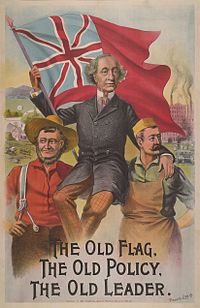
Back Portail:Conservatisme French Portal:Konservatisme NB Portal:Conservadorismo Portuguese Portal:Konservatism Swedish
| Main page | Showcase | Project |
Introduction
Conservatism is a cultural, social, and political philosophy and ideology, which seeks to promote and preserve traditional institutions, customs, and values. The central tenets of conservatism may vary in relation to the culture and civilization in which it appears. In Western culture, depending on the particular nation, conservatives seek to promote and preserve a range of institutions, such as the nuclear family, organised religion, the military, the nation-state, property rights, rule of law, aristocracy, and monarchy. Conservatives tend to favour institutions and practices that enhance social order and historical continuity.
Edmund Burke, an 18th-century Anglo-Irish statesman who opposed the French Revolution but supported the American Revolution, is credited as one of the forefathers of conservative thought in the 1790s along with Savoyard statesman Joseph de Maistre. The first established use of the term in a political context originated in 1818 with François-René de Chateaubriand during the period of Bourbon Restoration that sought to roll back the policies of the French Revolution and establish social order.
Conservatism has varied considerably as it has adapted itself to existing traditions and national cultures. Thus, conservatives from different parts of the world, each upholding their respective traditions, may disagree on a wide range of issues. Historically associated with right-wing politics, the term has been used to describe a wide range of views. Conservatism may be either libertarian or authoritarian, populist or elitist, progressive or reactionary, moderate or extreme. (Full article...)
Selected article
Selected quote
It only takes 20 years for a liberal to become a conservative without changing a single idea.
— Robert Anton Wilson, The Illuminati Papers (1980)
Selected image
Canadian Prime Minister John A. Macdonald called an election for 5 March 1891. The Liberals were heavily financed by American interests; the Conservatives drew much financial support from the CPR. The 76-year-old Prime Minister collapsed during the campaign, and conducted political activities from his brother-in-law's house in Kingston. The Conservatives gained slightly in the popular vote, but their majority was trimmed to 27. The parties broke even in the central part of the country but the Conservatives dominated in the Maritimes and Western Canada, leading Liberal MP Richard John Cartwright to claim that Macdonald's majority was dependent on "the shreds and patches of Confederation". After the election, Laurier and his Liberals grudgingly accepted the National Policy, and when Laurier himself later became Prime Minister, he adopted it with only minor changes.
Credit: Jkelly
Did you know...
- ... that California began celebrating Ronald Reagan Day on February 6, 2011, which would have been Reagan's 100th birthday?
- ...that in Edward Heath's 1968 Declaration of Perth, he pledged the Conservative Party's support for Scottish devolution, a policy later reversed by Margaret Thatcher?
- ... that Holby City woman is a voter demographic in the United Kingdom that was considered influential to the outcome of the 2010 United Kingdom general election?
Selected anniversaries in June
- 1979 – in the United States, the Moral Majority is founded by Jerry Falwell and Paul Weyrich.
- 1983 – the United Kingdom general election was held on 9 June. It gave the Conservative Party under Margaret Thatcher the most decisive election victory since that of Labour in 1945.
- 1987 – in a reference to the Berlin Wall, US President Ronald Reagan challenges Soviet leader Mikhail Gorbachev to "Tear down this wall!"
Topics
Associated Wikimedia
The following Wikimedia Foundation sister projects provide more on this subject:
-
Commons
Free media repository -
Wikibooks
Free textbooks and manuals -
Wikidata
Free knowledge base -
Wikinews
Free-content news -
Wikiquote
Collection of quotations -
Wikisource
Free-content library -
Wikiversity
Free learning tools -
Wiktionary
Dictionary and thesaurus
© MMXXIII Rich X Search. We shall prevail. All rights reserved. Rich X Search









